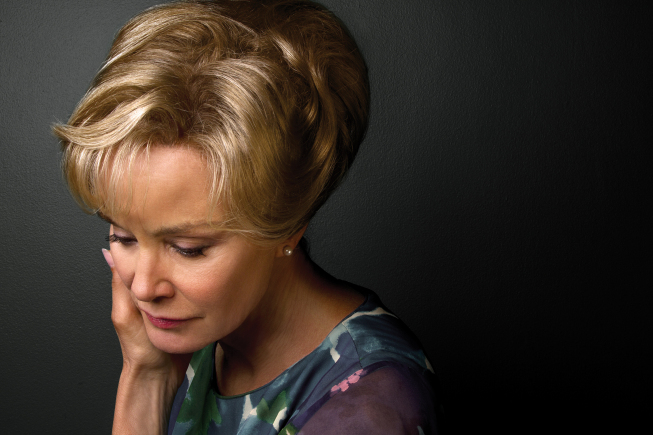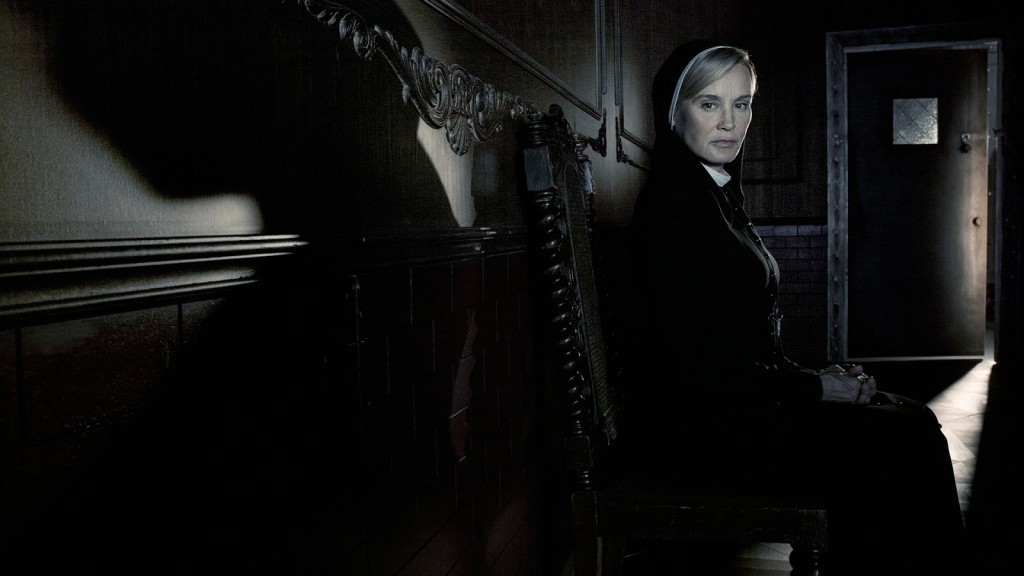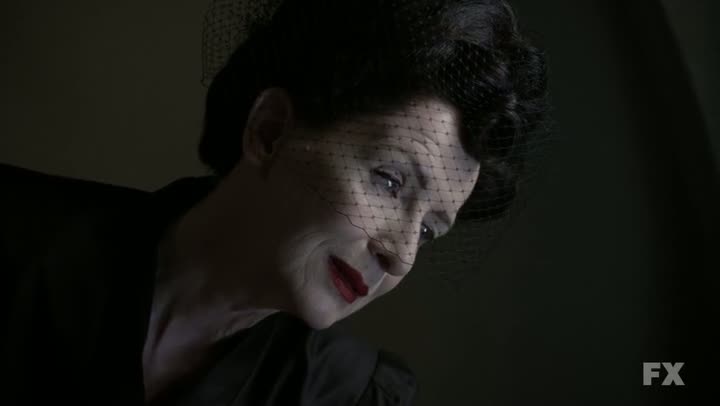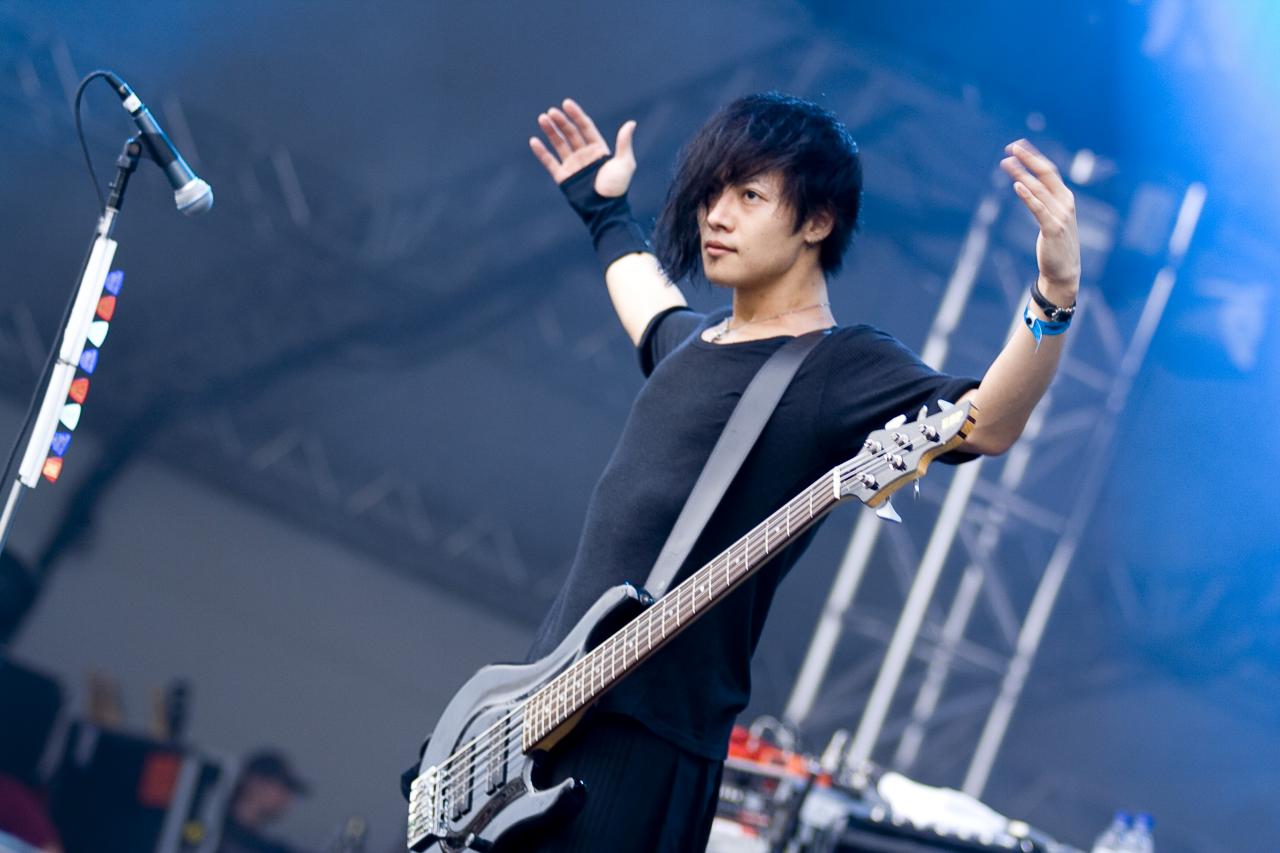Last year, two-time Academy Award Winner Jessica Lange blew audiences away with her incredible work as Constance Langdon on the hit FX Drama American Horror Story. For her performance, she won a Primetime Emmy, a Golden Globe and a Screen Actor’s Guild Award. But could she do it again?
Immediately after the first season ended, rumors swirled about whether or not Lange would return for a second season. As it’s structured, executive producers and co-creators Ryan Murphy and Brad Falchuk begin and end each story within the span of one season, bringing us brand new characters, context and horrors every September. Last year we had the Murder House, running rampant with tortured and deranged ghosts. It was pure paranormal horror, paying homage to everything from Rosemary’s Baby to The Shining. This year, however, Murphy and Falchuk have treated audiences to a deeper, more visceral kind of horror which, in spite of its peripheral paranormal elements, is human-driven at the core.
“We picked Asylum because it not only describes the setting,” Murphy said earlier this year, “an insane asylum run by Jessica Lange’s character which was formerly a tuberculosis ward – but also signifies a place of haven for the unloved and the unwanted. This year’s theme is about sanity and tackling real life horrors.”
During our previous coverage of Zachary Quinto talking about the character of Oliver Thredson, Quinto made similar remarks regarding not only the human horror involved in American Horror Story: Asylum, but the potential social impact holding a mirror to these issues can inspire:
“(Projecting) societal fear back at the audience, on some visceral level, is the most compelling kind of horror. And I think that’s what this show is doing in a lot of ways…tackling issues that have relevance to our modern society through another point of view, another time period, filtered through different perspectives — and really getting to the root of what drives us as a society, as a culture, or as an audience. I think that can be really scary, and I think that’s what’s really happening in a lot of ways with the characters that we’re all playing this year, and the scenarios in which they find themselves.”
Lange’s role this season is that of Sister Jude. Jude is a woman with a dark past who found a fragile kind of sanctuary behind a nun’s habit, following her reckless participation in what she perceived as an irreconcilable tragedy. Masterfully played, Lange has taken us into the deep psychological recesses of a tortured woman, an addict, desperate to create structure around chaos — and failing.
DarkMedia had the privilege to participate in an exclusive Q&A session with Jessica Lange, as she discussed American Horror Story, her process as an actress, how she feels about this stage in her career, and more.
On the concept of going too far: There are times when I think I’ve said, “This is too much,” but that’s not too often.
There was a leap of faith on my part, thinking, “Well, if I’m going to do this, I’m going to do this.” With a part like this, especially, and where we’re going with it, I can’t pull any punches, I can’t do it halfway. Especially when you’re dealing with madness, and this descent into madness. And I really felt like, “Okay, I’m going to embrace this one hundred percent and hopefully somebody will look out for me and not let me completely humiliate myself.”
On working within the structure of American Horror Story: “I’ve never worked this way before where it’s so fluid between the creators, the writers and me. Usually you get a script and it’s there, and it’s start to finish, and this kind of evolves and morphs as we go along. I do have more input, but then of course there are limitations within the structure of the whole story and the trajectory of where it’s going. But it’s been interesting, it’s been an interesting challenge.”
On being a part of Season 3: “I think I will try it again, depending on what the story is and who the character is, and all of that, so we’ll see. We’ll see what happens.”
On the differences between Constance and Jude: “I think puppet master is a very good description of Constance. The thing that I found, the spine of the character of Constance, was this was a woman who had basically lost everything and had nothing left to lose, and also was extremely unafraid. So, she just kind of manipulated her way and put herself in situations that other people probably would not have.
With Jude, she has a lot to lose because she’s holding onto something that she feels has saved her life, and redeemed her. And then it all becomes clear that everything was false, from the idea that she did not run over and kill this child, which is what sent her on this whole path, trying to find some kind of life, some redemption, some spiritual life. When she discovers everything is false, from the beginning, there’s a descent into madness that is completely different. And, for me, much more interesting to play.

I thought Constance was a wonderful character; she was kind of a throwback to the 40s, a ‘tough dame’, sweet-talking but with a real edge, she did not suffer fools, nothing went past her. She had a way of moving through everything and getting what she wanted. This woman (Jude) is much more vulnerable, and I think, in some way, tragic. She’s destroyed her life. She’s an addict, she’s an alcoholic, she’s had bad luck with men, a lot of bad men in her life, and she’s come to the end of the road with the hopes that this church, that this man, the Monseigneur, is going to save her; that she’ll become something else, that she’ll make her life worth living. And of course that all comes down, crashing. And she’s left absolutely alone, completely. Those are two things I love playing, because you also find them in (Tennessee) Williams characters; that thing of aloneness, the idea of being completely alone in the world, and couple that with madness. It’s a really potent combination to play.”
On Jude’s character arc: “This thing kind of has a life of its own. It’s like a river; it moves in one direction, and then it continues that way, and then it shifts directions. I think Ryan has these things roughly plotted out, of where things are going to go, but I don’t always know ahead of time. I understood we would be dealing with this kind of descent into hell, but I did not know really that Jude would rise to the top of this, in a way. In a way, that’s what makes it interesting to play, because usually you get a script, and you have all the story, all the acts are there, for a play, what happens in the first second and third acts; you know how it starts, you know where you go and how it finishes. And with this it’s a whole new experience. I don’t know where it’s going, it’s kind of like life; you don’t know what’s going to happen next. And it’s been an interesting way to work. It’s made me work in a braver way, in a way, in just taking every chance that comes along. I don’t plan things ahead of time, I don’t map out the character, I don’t do anything. It’s really been for me a great powerful exercise of just working in the moment, from this moment to the next moment. I actually think that it’s made me a better actor, in a way. Because of not being able to go into something predetermined.”
On next week’s episode, with Sister Jude as a patient at Briarcliff: “Everything gets put in motion now, as far as Briarcliff, and the demise of that institution and everybody’s departure from it, except mine. She actually does now try to right the wrongs that she has done, but of course she’s totally trapped within her own making, in a way.”

On the controversial and visceral subject matter covered on AHS: “Sometimes, episode to episode, I think, “My God, what the hell are we doing? We shouldn’t be doing this.” And yet, the thing that always amazes me is nothing that we do in this show, really, is not somehow founded in some reality, somewhere. Like this whole thing with the character of Bloody Face, I was reading about (serial killer) Ed Gein not too long ago; how he actually wore his victims’ skin. Whatever is imagined in this show is nothing that has not happened somewhere in the world, at some point.”
On how she’d describe this stage in her career: “Now, I feel like I have nothing to lose, so I don’t mind putting myself out there in the most kind of raw, naked exposed way. I also am able to do that because I really feel that Ryan would protect me, somehow. I feel at this point, now, I can take any chance I want, I can go as far as I want, because judgement doesn’t matter to me anymore. I think in the beginning, it does; the slings and arrows…none of that matters to me anymore. Now the only thing that I care about is is it thrilling, am I doing something I haven’t done before, am I true? I think that’s the main thing: have I found some vein of truth? And then I’ll follow that as far as I can go with it. So it’s a different way of working, I guess. I don’t know if it has as much to do with age as has to do with how long I’ve been doing it.”
On supernatural horror versus human horror and its effect on the audience: “I think it’s darker, I think the whole story is darker this time. It deals, I think, on a much darker psychological level. You’ve got human experiments. I think in some way, last season was kind of like a ghost story. And this season really is the darker parts of the human psyche that Ryan is exploring. I think the effect is that it’s hard to watch, I hear that from people a lot. “I can’t watch it, it’s too horrifying,” or whatever. I think you have to strike a balance. I think this season became darker than anybody anticipated, just because of the subject areas they laid out in the beginning; ex-Nazi SS doctor and human experiments, the serial killer based on this character Ed Gein, the warehousing of human beings in these institutions, madness. There’s a lot of subjects they’re covering that lend themselves to great horror stories.”
On her process as an actress: “Recently, like I said earlier, I’ve been trying to work in a very immediate fashion, so that I’m relying much more now on just pure imagination that comes up in a moment, and I just follow that through, rather than trying to plan anything or design anything, and I think that’s the biggest difference. With fictional characters, you rise and fall on the strength of your imagination, I think. With someone like Big Edie (Lange’s character on HBO’s award-winning miniseries Grey Gardens), of course, I had a wealth of resource material to draw from.
The thing I’ve been working on more and more lately is finding the character through the voice. Sometimes I would work on finding it through the emotional core, which is still the main element I work in. But (in contrast to) the external, finding it through movement or body or whatever, now I try to find it through voice. And it’s been very interesting because with Big Edie, every day I’d come to the set I would listen to her voice. I would put on the DVD of Grey Gardens, and not look at the image but just hear the voice. And as soon as I found that voice I could drop into the character. Now, with Sister Jude this year, I’ve also found a voice that, as soon as it’s there and present, I feel like I sink into the character. And I’ve done something with the voice as it’s gone along, that it’s been changing as we go down this rabbit hole. That’s kind of how I find that I’m working now; strictly through the imagination and then looking for the character, trying to find the character, mostly through the voice.”
On the quality of the cast of AHS, and who she’s enjoyed working with the most: “I think the acting has been really amazing this year, a lot of the actors came back from last year and it’s kind of wonderful. I think what Ryan had in mind is this kind of Mercury Theatre, this idea of having a repertory company and moving them from one project to another. And there’s something kind of great about that; watching these actors come in and create a different character.

One of my favorite actors that I’ve worked with in these episodes, last year and this year, is Frances Conroy. There’s just something when we’re on screen together, something happens. I think one of my favorite scenes I’ve played this year is the scene from episode seven, in the diner, when she’s come for me as the Angel of Death. There’s a kind of connection that you can’t really describe. Certain actors just find something when they’re working together, and that’s how I felt in these scenes with Franny. But every actor that I’ve worked with on this, James (Cromwell), Sara (Paulson), Lily (Rabe), it’s just a pleasure to work with them. Even the actors who just come in for a day’s work have been amazing and have really brought something, and make your work better.”
More on her scene in the diner with Frances Conroy as the Angel of Death: “I thought it was really well-written. So, that’s the first thing. If you’ve got it on the page, then you can find a way. The worst thing in the world is to try to play a poorly written scene, so that, right away, I give credit to the writers and to Ryan. What’s been kind of interesting about this process is that it keeps unfolding and unfolding, and you come back each episode with the experience of what you’ve already played. I just felt that that scene is the turning point for my character. Because, after this, she becomes entrapped, and it’s such an honest and vulnerable moment. It shifts the playing field, in a way, from who she was up until that point, and who she’s going to become. Every once and a while, and I don’t really know how to describe it, something just happens within a scene and it feels right. It feels honest, it feels pure, and it feels like it’s elevated the character to something else. It’s a mystery to me, why some things work and some things don’t. But, yes, I really thought that that scene was really kind of the crux of the character.”
For our continued weekly coverage of American Horror Story: Asylum, by contributor Sarabeth Pollock, please click here. And stay tuned for more interviews, reviews, and special features, right here on DarkMedia.com.
















5 Comments